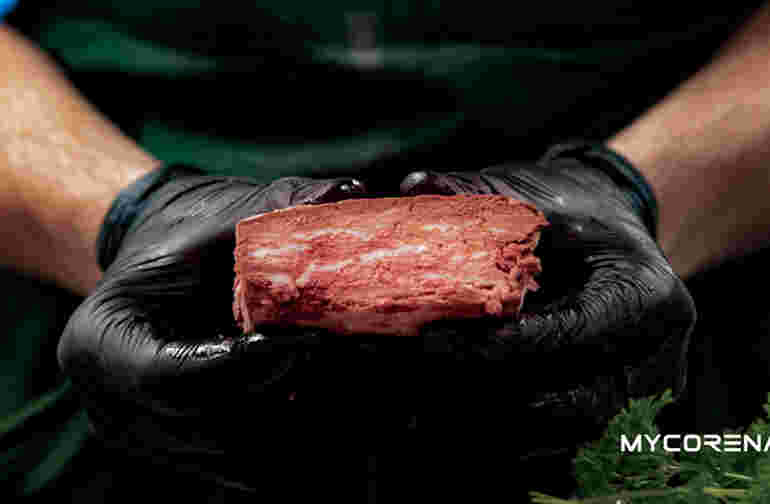Ram Nair, the visionary founder and CEO of Mycorena in front of the new factory in Falkenberg, Halland.

Discover Ram Nair and his team at Mycorena, pioneers of a unique food alternative that goes beyond vegetarian or meat substitutes. They’re making impressive strides toward their goal with substantial investments in a cutting-edge factory located in Falkenberg. This state-of-the-art facility will pave the way for the production of Promyc, their innovative fungi-based food, by establishing a brand-new infrastructure.
Ram Nair, the visionary founder and CEO of Mycorena, embarked on this journey based on his extensive research in biotechnology during his PhD. Today, Mycorena stands as one of Europe’s leading foodtech companies.
Investing in innovation
To fuel their growth, Mycorena has sought strategic investments. Ram Nair, who has a deep-rooted fascination with fungi, recognized the unexplored potential in the food industry. Mycorena works with unique fungi strains, which they call ”super fungi.” This distinctive focus has driven them to develop specialized equipment and collaborate with Tetrapak for their fermentation units.
Thriving in Falkenberg
Choosing Falkenberg as the site for their new factory was a strategic move. The region showed immediate interest in attracting food companies, boasting a strong food culture and established collaborations with large food producers in Sweden. Falkenberg became an ideal fit for Mycorena to flourish.
“Falkenberg showed great interest really from day one, they had been wanting to bring food companies to their region and they have many long-standning collaborations with large food producers in Sweden. So, in that context, we’re very glad to come down here to the south where food is in the DNA,” Ram Nair says.
A sustainable and protein-rich alternative
Mycorena’s fungi-based food innovation offers a sustainable and high-protein alternative to traditional animal, plant, soy, or pea-based products. Their fungi-based protein, Promyc, surpasses the protein content of regular mushrooms. With a chicken fillet-like appearance and easy transformation into minced meat or other forms, Promyc stands out among its competitors.
Our fungi has a lot more protein than a traditional mushroom. And when produced, the root structure, mycelium, looks and grows like a cotton thread in water. When we take it out of the liquid and remove the water, it looks exactly like a chicken filet. And that’s how it differs from pea or soy-based protein. For example, pea is made into a powder and is then texturized. We have no need for that process with our fungi, which means we can go directly from fermentation to have it look exactly like a chicken filet. We can also make it into minced meat very easily.
Ram Nair, founder and CEO of Mycorena
Promyc: The ”Quite Boring Ingredient”
Mycorena brands its product Promyc as a ”quite boring ingredient,” which might seem odd at first glance. However, this tagline emphasizes its versatility as a blank canvas for adding flavors during cooking. Unlike products with inherent flavors and numerous additives, Promyc provides a clean-label ingredient with minimal additional ingredients.
Plant based meat with a unique fungi-based fat ingredient that can enhance taste similarly to fat in animal meat, taking plant-based meat to the next level.

Halland: A home for food innovation
Ram Nair considers Halland and Falkenberg as their true home. The region’s vibrant food community and extensive knowledge make it an ideal place for Mycorena’s food innovation to thrive. They value the local collaborations and deep-rooted food expertise found in Halland and southern Sweden.
“In the beginning, we looked at several regions where we could position ourselves with our product. We found Halland and Falkenberg the most interesting because, as I mentioned, food is in the DNA here. There’s a huge food community, which makes it easier for us to get in there and collaborate with local knowledge. Food is in the people, companies and communities in Halland. Also, true for south Sweden in general is that food knowledge is much higher here,” Ram Nair says.
Challenges and the blueprint for the future
Building infrastructure for fungi-based foods presents significant challenges, as no existing framework is comparable to products like Quorn. Mycorena’s substantial investment in the Falkenberg factory, costing around 40 to 50 million euros, demonstrates their commitment to developing a whole new infrastructure from scratch. The factory focuses on producing Promyc and serves as a blueprint for future factories.
Mycorena envisions a sustainable and efficient production model, allowing for scalable factory models in diverse locations, from cities to deserts. Their goal is not only to bring their product to market but also to help others build similar factories using their blueprint.
“We’re simply a food alternative. It doesn’t matter if it’s soy, pea, or wheat, in general these are all processes which require huge amounts of land and water, so it has a big impact on the climate. For us, we’re able to be in production in a sustainable, efficient manner and factories can be constructed in more scalable models, having them placed in cities as well as in the middle of the deserts,” Ram Nair says.